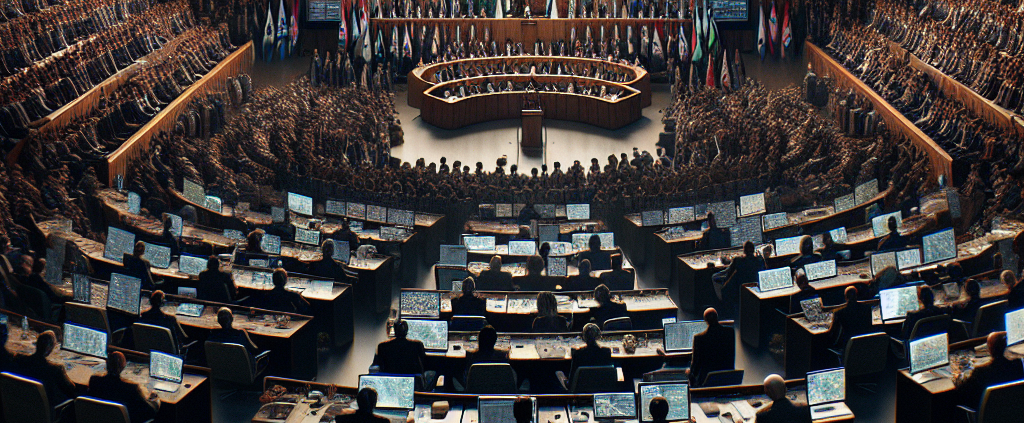Gaza Resettlement Strategies: Navigating Technology, Ethics, and Geopolitics
In the contemporary discussion regarding geopolitical strategies and their broader implications, a notable development occurred during the “Conference for Israel’s Victory,” hosted in Jerusalem’s International Convention Center. This event, attended by an array of Israeli cabinet ministers and coalition members, depicted an optimistic yet controversial future for the Gaza Strip post-conflict. Utilizing my interdisciplinary background spanning from information systems and artificial intelligence to law, I find the intertwining of technology, governance, and ethical considerations in this scenario particularly fascinating.
Understanding the Vision: Gaza’s Proposed Future
The conference presented a vision heavily underscored by the aftermath of October 7, proposing the resettlement of the Gaza Strip. This proposition involves planting the seeds for new settlements across the region, a topic that has polarized opinions internationally. As a professional who has navigated the complexities of artificial intelligence in decision-making processes, the leverage and implementation of such a geopolitical strategy underscore the profound weight of ethical considerations in the automation and prediction of political outcomes.
Artificial Intelligence and Ethics in Geopolitical Strategies
- Integration of AI in assessing resettlement outcomes
- Implications of automated decision-making in conflict zones
- Ethical frameworks guiding AI applications in geopolitical strategies
Finance Minister Bezalel Smotrich and National Security Minister Itamar Ben Gvir articulated their perspectives, touching upon the complexities of voluntary migration and the international legal landscape, reflecting the intricacies I’ve studied in law school. Their narratives were complemented by Daniella Weiss and Yossi Dagan, who are charting plans for seizing this emergent potential for settlement expansion.
Legal and International Perspectives
The conference’s disposition towards the resettlement of Gaza, advocating for a shift in the demographic and territorial status quo, ventures into legal territory that intersects with my current law studies. International rulings, such as those from the International Court of Justice, highlight the legal predicaments and international scrutiny tied to such propositions.
Technological Undertones and Humanitarian Considerations
From a technological standpoint, artificial intelligence and cloud solutions—the bedrock of my firm, DBGM Consulting, Inc.—offer unparalleled capabilities in modeling scenarios that include resettlement and infrastructural development. However, the ethical dimension, emphasized during my tenure at Microsoft and my academic journey at Havard University, mandates a balanced approach that aligns with humanitarian considerations and compliance frameworks.
Cloud Solutions and Infrastructure
- Modeling resettlement scenarios through cloud-based platforms
- Impact of infrastructure modernization on post-war redevelopment
- Compliance with international standards in deploying technology
Voices from the conference illuminate a vision propelled by the October 7 aftermath, aiming to transform the Gaza Strip into a flourishing hub for new settlers. However, this vision is not devoid of contention, especially considering the fate of the current Palestinian residents. The dialogue around “voluntary migration” and the explicit endorsement of resettlement strategies reveal a complex tapestry of geopolitical, ethical, and technological dimensions that my professional and academic experiences have equipped me to analyze.
The discourse surrounding Gaza’s future post-October 7 emerges as a poignant case study in the intersection of technology, politics, and ethics—a nexus I’ve navigated through my diverse career from a solutions architect at Microsoft to a law student. The application of my background in AI and cloud solutions presents an avenue for in-depth analysis of the potential impacts and ethical considerations surrounding such geopolitical strategies.
Conclusion
The discussions and proposals that unfolded at the “Conference for Israel’s Victory” reflect a complex interplay of ambition, legal challenges, and the ethical dilemmas inherent in reshaping the geographical and political landscape of the Gaza Strip. As we venture into an era where the imprints of technology on geopolitical strategies become more pronounced, the need for a multidisciplinary approach that embraces ethical considerations, compliance, and the human impact of such decisions becomes increasingly paramount.
Focus Keyphrase: Gaza resettlement strategies









Leave a Reply
Want to join the discussion?Feel free to contribute!